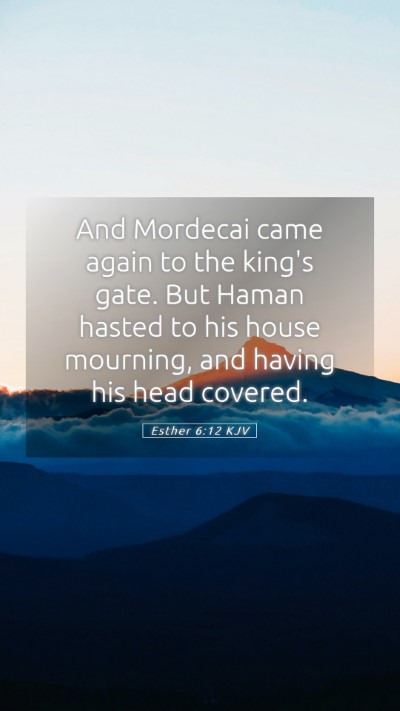Old Testament
Genesis Exodus Leviticus Numbers Deuteronomy Joshua Judges Ruth 1 Samuel 2 Samuel 1 Kings 2 Kings 1 Chronicles 2 Chronicles Ezra Nehemiah Esther Job Psalms Proverbs Ecclesiastes Song of Solomon Isaiah Jeremiah Lamentations Ezekiel Daniel Hosea Joel Amos Obadiah Jonah Micah Nahum Habakkuk Zephaniah Haggai Zechariah MalachiEsther 6:12 Meaning
What is the meaning of Esther 6:12?
And Mordecai came again to the king's gate. But Haman hasted to his house mourning, and having his head covered.
Esther 6:12 Bible Verse Meaning
Understanding Esther 6:12 - Bible Verse Commentary
Esther 6:12 states: "And Mordecai came again to the king’s gate. But Haman hurried to his house, mourning, and having his head covered."
This verse follows a pivotal moment in the narrative of Esther, in which Mordecai has just been honored by King Ahasuerus, while Haman, who plotted Mordecai's destruction, faces humiliation instead. The verse serves as a profound reflection on themes of justice, divine providence, and the shifting fortunes of individuals.
Bible Verse Interpretations
In the context of Esther 6:12, several biblical commentaries offer insights into its meaning and implications:
-
Matthew Henry:
Henry emphasizes the justice of God in reversing Haman's fortune. He notes that Mordecai's return to the king's gate symbolizes his restored honor and prominence, contrasting sharply with Haman's despair. This reflects the biblical principle that pride precedes a fall, and those who plan harm against the righteous will ultimately face their consequences.
-
Albert Barnes:
Barnes highlights Haman's visible distress and humiliation as he returns home. He points out that covering one's head in mourning is a traditional expression of grief. Haman's shame is compounded by the fact that he has been publicly revealed as the architect of Mordecai's intended destruction, illustrating a key motif in the book of Esther: the downfall of the wicked.
-
Adam Clarke:
Clarke discusses the character development of both Haman and Mordecai in this scene. He notes that Haman's hurried return home signifies his fear and desperation, while Mordecai's steady composure points to his faith and trust in God's plan. This contrast reinforces the narrative's theme of divine justice, where the righteous are vindicated, and the wicked face ruin.
Application of Biblical Teachings
The message found in Esther 6:12 can be applied to daily life through various biblical principles:
- Faith in Divine Justice: Just as Mordecai was honored after being wronged, believers can trust that God observes injustice and will act in His timing.
- Humility versus Pride: Haman’s downfall serves as a reminder to practice humility, as pride often leads to one's destruction.
- Importance of Integrity: Mordecai’s actions throughout the narrative emphasize the value of standing for what is right, regardless of the consequences.
Related Scripture References
Esther 6:12 is related to several passages that reinforce its themes:
- Proverbs 16:18: "Pride goes before destruction, and a haughty spirit before a fall."
- Galatians 6:7: "Do not be deceived: God is not mocked, for whatever one sows, that will he also reap."
- Psalm 37:34: "Wait for the LORD and keep his way, and he will exalt you to inherit the land; you will look on when the wicked are cut off."
Conclusion
Esther 6:12 encapsulates critical lessons on justice, humility, and God's sovereign plan. As believers engage in bible study groups or online bible study, this verse offers a rich opportunity for discussion and contemplation over these themes. Understanding such verses through bible study resources and bible study tools enhances one’s grasp of scripture and allows for deeper Biblical exegesis.
Final Thoughts
In conclusion, understanding Scripture requires careful scripture analysis and a willingness to apply biblical truths to our lives. Esther 6:12 serves as a poignant reminder of the divine order within the chaos of human actions, encouraging believers to trust in God’s ultimate justice and favor.


